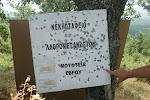



Στο όνομα του μεγαλοδύναμου Θεού,
Χαιρετάμε όλους αυτούς που βλέπουν τους καταπιεσμένους που το μόνο που έχουν να χάσουν είναι οι Αλυσίδες τους. Μακάρι το όνομά σας να μείνει ζωντανό και για τις επόμενες γενιές.
Στο Αφγανιστάν τα προβλήματα είναι πάρα πολλά: πόλεμος, τρομοκρατία, ρατσισμός, θρησκευτικός φανατισμός, φονταμενταλισμός κλπ. Αυτοί που θέλουν να κυνηγήσουν, να φοβίσουν τους ανθρώπους, καθώς και αυτοί που ήρθαν για να προστατέψουν τους ανθρώπους, όλοι αυτοί κατέστρεψαν το Αφγανιστάν. Για πολιτικούς και οικονομικούς λόγους οι νέοι του κατεστραμμένου Αφγανιστάν αναγκάστηκαν να εγκαταλείψουν τα σπίτια τους. Η ζωή στον κόσμο και φυσικά στην Ευρώπη είναι ασφαλέστερη και πιο εύκολη. Ελπίζουμε και παρακαλούμε όλοι οι υπεύθυνοι που δουλεύουν στην αστυνομία και οπουδήποτε αλλού να είναι καλοί με τους μετανάστες και πρόσφυγες. Ιδιαίτερα οι νέοι, η κολώνα της κοινωνίας.
Στόχος των μεταναστών είναι να βρουν μια καλύτερη ζωή, να μπορέσουν να αξιοποιήσουν το μυαλό τους και αυτό μόνο γίνεται στις χώρες που θέλουν τους μετανάστες.
Υπάρχουν χιλιάδες πρόσφυγες και μετανάστες στις Ευρωπαϊκές χώρες όπως η Ελλάδα και στη φυλακή της Μυτιλήνης. Είμαστε στεναχωρημένοι από την κατάσταση στην Ελλάδα και την διαγωγή της αστυνομίας.
Πρώτο πρόβλημα: η συμπεριφορά της αστυνομίας στην φυλακή δεν είναι συμπεριφορά προς ανθρώπους και μας χτυπάνε κάθε μέρα.
Δεύτερο πρόβλημα: δεν υπάρχει νερό στην φυλακή και πολλοί όταν πίνουν αρρωσταίνουν.
Τρίτο πρόβλημα: κρατούνται πολλοί νέοι μέσα στους θαλάμους που έχει πολύ ζέστη.
Αρρωσταίνουμε άλλοι από την κακή διαγωγή της αστυνομίας και άλλοι επειδή η αυλή της φυλακής είναι πολύ μικρή και οι φυλακισμένοι βγαίνουν έξω από τον θάλαμο άλλοτε για μία ώρα και άλλοτε για δέκα λεπτά. ολόκληρο το εικοσιτετράωρο.
Τέλος εμείς που είμαστε νέοι και ανήλικοι τα προβλήματα που έχουμε θέλουμε να τα πούμε στο Υπουργείο μεταναστών, στο υπουργείο Υγείας και στην Ευρώπη.
Από το κράτος της Ελλάδας θέλουμε να διαλέγουν καλά αυτούς που δουλεύουν στην φυλακή. Επίσης θέλουμε από την Ευρώπη να βοηθήσει την Ελλάδα για να μπορέσει αυτή να βοηθήσει τους μετανάστες και πρόσφυγες.
Παρακαλούμε να μην απελάσουν τους μετανάστες στις χώρες τους και να εμποδίσουν τις απελάσεις για να βοηθήσουν τους ανθρώπους.
Ανώνυμο Ποίημα
…
όλοι οι άνθρωποι είναι σαν ένα σώμα
και ίδιο
αν μία μέρα πονέσει ένα μέλος
δεν μπορούν να αντέξουν τα άλλα μέλη
eσύ αν δεν μπορείς να καταλάβεις
τι πόνο έχουν οι άλλοι άνθρωποι
δεν μπορείς να λέγεσαι άνθρωπος
….
Ανήλικοι κρατούμενοι Παγανής
10/8/09





